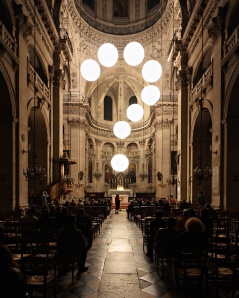
photography by Marc Domage, installation by Robert Stadler
My small group is a little shy of your run-of-the-mill “Bible studies” and other evangelical-culture-approved curricula, so for the past year we’ve been reading through different religiously-oriented books, and for the next couple of months we’re going through Gregory Boyd’s Benefit of the Doubt: Breaking the Idol of Certainty. I’m only to chapter five, but I think I’ve already recommended it around a dozen times. I think Boyd addresses an incredibly important question I’ve heard so many people asking: what does it mean to have faith, to believe? The typical evangelical teachings about faith usually involve this nebulous idea that “faith” equals “certainty”– that you feel sure. That if you can just convince yourself that God will heal a loved one . . . that God will heal that loved one.
It’s a crazy idea, and I really do think the book is worth reading. I’ll let you know for sure when I finish it.
But, as I was reading it last week, something he talked about jumped out at me: that this approach of “feeling certain” is incredibly attractive– he describes it as “blissful.” It didn’t take me more than a second to connect this to fundamentalism, because if there’s one thing that unites fundamentalists, it is how incredibly certain they are.
When I did my series on defining fundamentalism, I asked all of you to explain what had drawn you to fundamentalism in the first place, and almost unanimously the response was that fundamentalism was comfortable– that the black and white nature of how fundamentalists approach questions made things simple. Fundamentalism is straightforward. Fundamentalism is easy, and given that we live in a world filled with horrible suffering, that this one approach to faith means you don’t have to struggle with soul-deep questions is compelling.
It occurred to me that this “certainty model of faith,” as Boyd calls it, might be what’s fueling Christian fundamentalism in America. Because, if certainty really does equal faith, and Christians are spending most of their energy trying to convince themselves, then it almost seems that becoming a fundamentalist is inevitable. It’s unlikely that evangelicals are going to go gung-ho and they’ll all start touting KJV Bibles or giving up their Christian rock, but when it comes to the practice of faith, how can fundamentalism be avoided if what we’re seeking is certainty?
There’s a term I’ve seen popping up in different conversations– fundigelical. From watching conservative evangelical culture over the past few years, I’ve noticed that there’s been a slow blurring between evangelicalism and fundamentalism. It used to be that evangelicals were insanely liberal by fundamentalist standards, but now? I can barely tell the difference anymore. And maybe that’s just because I’m a progressive Christian so everything to the religious or political right of me all looks the same, but I think I have a little more discernment than that.
I’m looking at things like the Council for Biblical Manhood and Womanhood, and The Gospel Coalition, and I paid close attention to the Southern Baptist Convention last year . . . and what I’m seeing disturbs me. When men like C.J. Mahaney, whose sermons are indistinguishable from any fundamentalist diatribe I heard growing up, are the leaders of entire evangelical movements, when they are closely connected to one of the largest American denominations, it forces me to ask if whether or not fundamentalism is creeping into evangelical culture. When men like Mark Driscoll draw mile-wide lines in the sand, separating “us” and “them,” I start wondering– how truly different is modern evangelicalism from the fundamentalism I grew up in?
They certainly look different.
But are they, really? Once you get passed the haircuts and the ankle-length skirts, they don’t seem to be. Ideologically they’re practically inseparable– both sets hold to The Fundamentals:
Inspiration and Inerrancy of Scripture
Deity of Christ
Virgin birth
Substitutionary atonement
Physical resurrection and physical Second Coming
As a progressive Christian looking back at what I used to believe, this list seems a little… interesting. None of these things are what anyone would define as “the essentials for salvation,” but this, apparently, is the Hill Worth Dying On to fundamentalists. A specific and relatively new atonement theory, selected from among at least a half dozen others? An approach to the inspiration of Scripture that cannot be proven, not now and not in the future, since we have never had the autographa— and an approach that is, in practice, absolutely useless? A single, solitary approach to eschatology that is a massive departure from almost two thousand years of church teaching?
These are what fundamentalists in the historical sense of the term decided that they were going to be absolutely certain of– and they are the core ideas of evangelical theology. When I poke around some of the evangelical blogs that I read consistently, they tend to make it clear that in order to write for them you have to believe The Fundamentals.
When I first started writing here, when I created this blog, almost all of my focus was on the Christian fundamentalist mindset that I grew up in. But, over the last year, there’s been a slow shift in the language I use– from fundamentalism to conservative evangelicalism to evangelicalism, and it was not a conscious decision. Part of it was that I moved on from talking about my childhood to things I’ve noticed as an adult in mainstream evangelicalism, but another part of it was that as I became more and more exposed to American evangelicalism I stopped being able to make a clear delineation. There just . . . wasn’t enough of a difference for me to treat them as clearly separate things.
And I’m beginning to think that it all goes back not to what people believe, but how they believe it.


